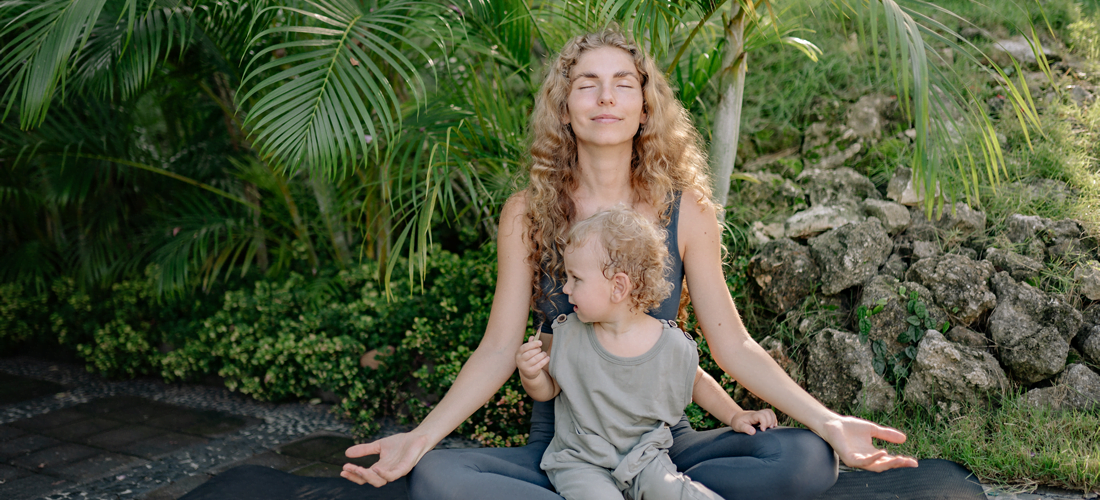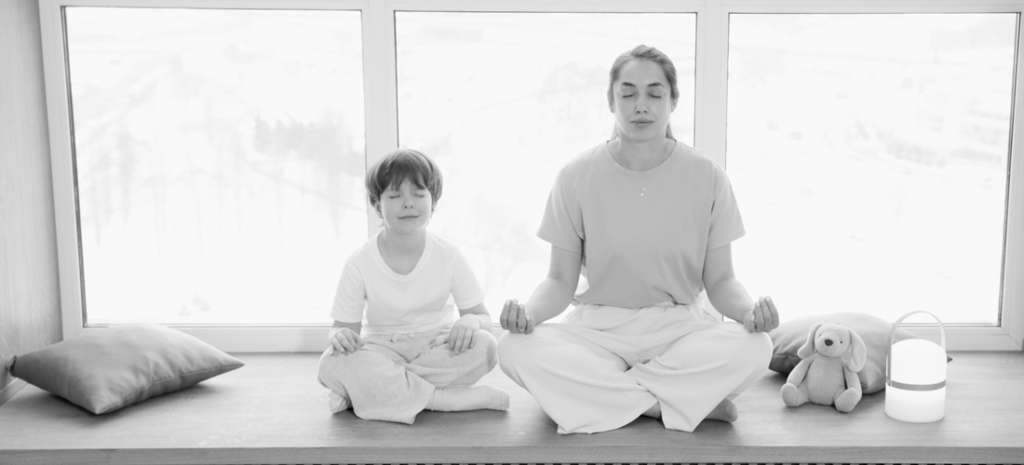In this blog post, we will look into the concept of mindfulness for better parenting. We will explore the various techniques and strategies that parents can employ to cultivate a mindful approach in their everyday interactions with their children.
Mindfulness, at its core, refers to the practice of maintaining a moment-by-moment awareness of our thoughts, feelings, bodily sensations, and the surrounding environment. It involves acceptance, meaning we pay attention to our thoughts and feelings without judging them—without believing, for instance, that there’s a “right” or “wrong” way to think or feel in a given moment.
In the context of parenting, mindfulness becomes immensely important. It allows parents to react to their children’s behavior from a place of calm and understanding, rather than frustration or anger.
This deliberate and thoughtful response can foster a more harmonious relationship between parents and children. It can also provide children with a positive role model for handling stressful situations, contributing to their emotional growth and resilience.
The Connection Between Mindfulness and Parenting
The connection between mindfulness and parenting is deeply rooted in the concept of emotional intelligence. When parents practice mindfulness, they are essentially developing their ability to understand and manage their own emotions.
In turn, this capacity allows them to better understand and respond to the emotions of their children. A mindful parent is more likely to observe their child’s behavior without immediate judgment, affording them the opportunity to respond in a way that acknowledges the child’s feelings, validates their experiences, and offers guidance in a supportive manner.
This approach fosters a secure emotional environment for children, where they feel heard and understood. In the long run, this can lead to enhanced self-esteem, emotional health, and interpersonal skills in children. The practice of mindfulness thus serves as an effective tool that parents can use to cultivate a nurturing and positive atmosphere in the home.
Mindfulness Techniques for Parents
1. Mindful Breathing Exercises
One of the simplest yet most effective mindfulness techniques parents can adopt is mindful breathing. Here’s a step-by-step guide to help you incorporate this practice into your daily routine:
- Find a quiet and comfortable space: Choose a spot where you won’t be distracted or interrupted. You can sit on the floor, on a yoga mat, or in a comfortable chair.
- Adopt a comfortable posture: Sit up straight, relax your shoulders, and place your hands on your knees or in your lap.
- Close your eyes and focus on your breath: Pay attention to the sensation of your breath as it enters and leaves your body. Notice the rise and fall of your chest or belly with each breath you take.
- Keep your mind focused on your breath: If your mind wanders (and it likely will), gently bring your focus back to your breath without any judgment.
- Practice this for a few minutes each day: Begin with 2-3 minutes of mindful breathing each day, gradually increasing to 10-20 minutes as you become more comfortable with the practice.
Mindful breathing exercises offer numerous benefits both for parents and children. For parents, it’s a practical tool to manage stress, reduce anxiety, and enhance emotional well-being. It fosters a heightened awareness of the present moment, promoting more patient and thoughtful responses to daily parenting challenges. This, in turn, fosters a more calm and nurturing home environment.
For children, these exercises can be a powerful avenue for promoting emotional self-regulation. Children can use mindful breathing to navigate feelings of anxiety or upset, learning to sit with their emotions rather than reacting impulsively. They also learn to focus, which can boost their academic performance and interpersonal relationships. Additionally, this shared practice can strengthen the parent-child bond and establish a solid foundation for effective communication and mutual understanding.
2. Mindful Observation
Incorporating mindfulness into your observation helps to ground you in the present moment and fosters a deeper connection with your surroundings. For parents, this can translate into more patience and understanding in responding to your child’s needs, promoting a happier and more peaceful home environment.
- Start Small: Begin with observing small, everyday things like how your morning coffee tastes or the texture of the carpet under your feet. By focusing on these minute details, you cultivate a deeper sense of awareness.
- Use All Your Senses: Don’t just rely on sight. Engage your other senses like touch, smell, and hearing. Observing how the air smells after a rainfall or the sound of leaves rustling in the wind can enhance your mindfulness.
- Non-judgmental Observation: Try to observe things as they are, without labeling or judging them. This can be challenging but is central to mindfulness. This non-judgmental stance can also be translated into your parenting, learning to accept your child as they are.
- Practice Mindful Observation in Nature: Nature offers abundant opportunities for mindful observation. Spend some time in a park or garden, observing the colors, textures, and patterns of the natural world.
- Involve Your Children: Encourage your kids to participate in these observation exercises. It will not only nurture their mindfulness skills but also foster a shared understanding and tighter bond between you.
Mindful observation can profoundly enhance your parenting skills. With mindfulness, you’re more able to fully engage in the present moment, aligning your responses more closely with your child’s immediate needs. This allows you to react with increased understanding and patience, reducing potential conflicts and promoting a more harmonious family environment.
Mindful observation encourages you to perceive your child without preconceived notions or judgments, which often stem from stress or past experiences. You learn to appreciate your child’s individuality, understanding their unique journey and needs.
In addition, involving your child in mindful observation fosters a shared understanding, creating a strong and healthy bond. This shared experience can open lines of communication, facilitate mutual respect, and nurture empathy, invaluable aspects of a healthy parent-child relationship. Ultimately, practicing mindful observation helps to create a loving, supportive, and mindful environment conducive to your child’s growth and wellbeing.
3. Mindful Self-Compassion
The importance of self-compassion in parenting is often overlooked, yet it’s crucial for not only your well-being but that of your child. As parents, we tend to be hard on ourselves, often falling into the trap of self-criticism, especially when we perceive ourselves as not living up to our own or society’s parenting expectations.
Practicing self-compassion allows us to recognize that parenting is a journey, filled with both triumphs and mistakes, all of which contribute to our growth and understanding. Embracing self-compassion can alleviate the stress and pressure of parenting, helping us to react positively in challenging situations, and model resilience and empathy for our children.
Here are some techniques to enhance self-compassion:
- Mindful Breathing: Whenever you find yourself overwhelmed or self-critical, take a few moments to practice mindful breathing. This technique brings you back to the present and creates a space between your feelings and reactions.
- Self-kindness: Replace self-criticism with self-kindness. Acknowledge your efforts and remind yourself that everyone makes mistakes. Understand that these are not failures, but opportunities for learning and growth.
- Gratitude Journaling: Regularly write down things you are grateful for. This practice shifts your focus from shortcomings to appreciating what you have and what you’ve achieved.
- Meditation: Regular meditation can help reduce stress and foster an attitude of self-compassion. There are many online resources and apps that offer guided meditations specifically targeted towards self-compassion.
- Self-Care: Make time for activities that you enjoy and that replenish you. Self-care isn’t selfish – it’s essential for maintaining balance and ensuring you have the emotional resources to care for your children.
Cultivating self-compassion takes time and practice, but the benefits are well worth the effort. By modeling self-compassion, you not only enhance your own emotional wellbeing but also teach your children a valuable lesson in understanding and kindness towards themselves.
Incorporating Mindfulness into Daily Parenting
1. Morning and Bedtime Routines
Creating a mindful start and end to your day can play a significant role in promoting better parenting.
Morning routines set the tone for the day, and incorporating mindfulness during this time can help both you and your children approach the day with calm and clarity. Start by waking up a few minutes earlier than your children to engage in mindful breathing or meditation. This practice allows you to center yourself before the demands of the day begin. Once the children are awake, encourage a quiet and mindful breakfast, where everyone is present and engaged in the meal, rather than rushing or being distracted by electronics.
Bedtime routines offer a chance to wind down and reflect on the day. It’s an ideal time to practice gratitude by discussing the positive experiences of the day. Teach your kids to establish a relaxation routine before bed, such as reading a book or listening to calming music, while avoiding screens. Guided meditation for sleep can also be introduced to help them settle down.
Consistency is key in building these mindful routines, and over time, these practices will become a cherished part of your family’s day.
2. Mindful Mealtimes
Mindfulness can also be applied to how we eat, creating an opportunity for better nutrition and more enjoyable mealtimes. Mindful eating involves paying full attention to the experience of eating and drinking, both inside and outside the body. It’s about noticing the colors, smells, flavors, and textures of food, chewing slowly, getting rid of distractions, and learning to cope with guilt and anxiety about food. Children can be encouraged to explore their food’s texture, smell, and taste and to eat slowly to enjoy every bite.
By turning meals into a time of relaxation and enjoyment, you can teach your children to have a healthy relationship with food and to listen to their body’s signals for hunger and fullness, rather than eating out of boredom or emotional distress. Moreover, mindful eating can improve digestion, reduce overeating, and lead to a more harmonious family environment. It’s not just about teaching good eating habits, but also about cultivating appreciation and gratitude for the food we have, promoting a better understanding of our relationship with food and its role in our lives.
Remember that this is a journey and changes might not happen overnight. Be patient and persistent, and model mindfulness in your own eating habits, as children learn most effectively through observation.
3. Managing Stress and Reactions
Parenting is filled with both joyous moments and inevitable challenges. Engaging in mindfulness techniques can make navigating these challenging situations a bit easier, fostering patience, understanding, and thoughtful reactions. Here are some strategies you can implement:
- Pause and Breathe: When a situation starts to feel overwhelming, the first step is to stop and take a moment to breathe. Deep breathing exercises can help to reduce stress and anxiety, bringing your focus back to the present moment and providing an opportunity to respond thoughtfully rather than reacting impulsively.
- Non-Judgmental Observation: Practice observing the situation without judgment. Instead of labeling events as ‘good’ or ‘bad’, try to see them as neutral occurrences. This allows you to respond to the situation rather than your perception of it.
- Mindful Listening: When dealing with challenging behaviors from your child, take the time to listen mindfully. This means fully focusing on your child’s words and feelings without interrupting or planning your response. It shows your child that they are heard and valued, and it might give you insights into the root cause of the behavior.
- Self-Compassion: Remember to be kind to yourself. Parenting is a tough job, and it’s okay not to have all the answers. Show yourself compassion when things don’t go as planned. It will help you maintain a positive mental state and model healthy emotional responses to your child.
With practice, these mindfulness techniques can become a natural part of your parenting toolkit, helping to create a more peaceful and supportive family environment.
Mindful Parenting for Specific Ages and Stages
Mindfulness for Infants and Toddlers
Establishing Secure Attachments
Establishing secure attachments with your infant or toddler is a significant aspect of mindful parenting. Secure attachment forms when you consistently respond to your child’s needs in a loving and caring manner. This reinforces their trust in you and helps them build a sense of safety and security.
Try being fully present when interacting with your little one, whether you’re feeding them, changing their diaper, or playing together. Even in these simple activities, mindfulness plays a key role. By focusing on the present moment with your child, you can forge a stronger bond and foster a secure attachment.
Remaining Patient and Present
Patience is a virtue, especially in parenting. Infants and toddlers can be demanding with their constant needs for care and attention. Their inability to communicate effectively can sometimes lead to feelings of frustration for both of you.
However, remaining patient and present in these moments is crucial. Try to see the world from your child’s perspective, understanding that everything is new and overwhelming to them. This mindset can help you stay patient, allowing you to respond to their needs calmly and effectively.
Your calmness directly influences your child’s emotional state. The more present and patient you are, the more secure your child will feel.
Mindfulness for School-Age Children
Encouraging Open Communication
Encouraging open communication is an important part of mindful parenting for school-age children. This can be achieved by creating a safe space where your child feels comfortable to express their thoughts, feelings, and concerns without fear of criticism or judgment. Active listening is key in this process.
When your child talks, give them your full attention. Show interest in what they’re saying and provide thoughtful responses. This demonstrates respect for their perspective and encourages them to communicate openly and honestly in the future.
Supporting Emotional Development
Supporting emotional development is another crucial aspect of mindful parenting. Teach your child to recognize, understand, and manage their emotions. This can be done through regular discussions about feelings, using situations as teaching moments.
For instance, if your child is upset because they didn’t do well in a test, talk about how it’s normal to feel disappointed, but also stress the importance of learning from mistakes and trying again. By validating their feelings and providing guidance, you’re helping them develop emotional intelligence, which is essential for their wellbeing.
Mindfulness helps in being aware of both your and your child’s emotions, supporting an empathetic and understanding environment.
Mindfulness for Teenagers
Navigating the Challenges of Adolescence
Addressing the unique challenges of adolescence is a key component of mindful parenting. Teenage years are a period of significant personal growth and transitions, often accompanied by emotional upheaval.
As a parent, it’s important to acknowledge these changes and offer guidance through this challenging time. Make an effort to understand the pressures they face, such as academic stress, peer pressure, and self-image issues.
Mindfully respond to their experiences with empathy and patience, helping them navigate their journey towards adulthood with confidence and resilience. Encourage dialogue about these challenges, promoting a deeper understanding and offering them the tools to cope effectively.
Building Trust and Understanding
Building trust and understanding is paramount in the relationship between a parent and a teenager. Trust is fostered through open, honest communication and consistent, respectful behavior. It’s essential to uphold the promises you make and show understanding towards their experiences.
This trust, in turn, encourages your teenager to confide in you, ensuring a supportive environment when they’re dealing with difficult situations. Practice mindful listening, show genuine interest in their activities, and respect their thoughts and opinions.
By doing so, you’re fostering a bond based on trust and understanding. Mindfulness plays an instrumental role here, as it allows you to stay present, engaged, and responsive in your interactions with your teenager.
Mindful Parenting Tips for Co-Parenting
Strategies for Practicing Mindfulness as Co-Parents
- Open Communication: Co-parenting requires both parents to communicate effectively about their child. This includes discussing the child’s daily activities, upcoming schedule changes, and any changes in behavior or mood. Mindfulness can help in these conversations, as it promotes listening without judgment and responding with empathy.
- Consistency in Rules: Consistency is key when co-parenting. All rules and consequences should be the same or similar at both households to maintain stability. To achieve this, practice mindfulness by understanding and respecting your co-parent’s perspective. Discuss and negotiate rules that work for both homes.
- Focus on the Child’s Needs: The needs of the child should always be the foremost priority. This can sometimes mean setting aside personal feelings or disagreements. Mindfulness helps to focus on the present moment and consider what is best for the child right now.
- Respect: Respect for the other parent is crucial, regardless of personal feelings. This means not talking negatively about the other parent in front of the child and respecting the other parent’s time with the child. Practicing mindfulness can aid in managing your emotions and responding respectfully.
- Seeking Support if Needed: If co-parenting becomes challenging, don’t hesitate to seek professional support. Therapists or coaches with mindfulness expertise can provide strategies to manage stress and improve the co-parenting relationship.
By integrating mindfulness principles into these strategies, co-parents can alleviate potential stress and disagreements, ensuring a nurturing environment for their child. Mindfulness for better parenting promotes attentiveness, compassion, and understanding, which can significantly enhance the co-parenting experience.
Promoting Consistency and Unity in Parenting Styles
Promoting consistency and unity in parenting styles is a cornerstone of effective co-parenting. This consistency provides a stable, predictable environment for children, which is pivotal to their well-being and development.
By employing mindfulness, parents can effectively communicate and collaborate on shared rules, discipline strategies, and reward systems, assuring a unified approach. This doesn’t mean both parents have to parent in the exact same way. Each parent will have their unique style, but key principles and values should be consistent.
Mindfulness plays a key role in fostering this unity. It encourages parents to stay present, listen respectfully to each other’s viewpoints, and make decisions that reflect a shared vision for their child’s upbringing.
Mindfulness for better parenting involves open dialogue, understanding, and compromise. It ensures that the child experiences a consistent parenting approach, even when parents live separately. Practicing mindfulness promotes empathy, patience, and emotional regulation, aiding in the establishment of harmonious co-parenting practices.
Resolving Conflicts Mindfully
Resolving conflicts mindfully is an integral part of co-parenting. It involves managing disagreements in a calm and respectful manner, grounded in the present moment, and with the child’s best interests at heart. Mindfulness encourages parents to approach conflicts with empathy, clarity, and open communication, rather than reacting impulsively or defensively. It provides the space to respond thoughtfully, paving the way for constructive conversation and problem-solving.
Mindfulness for better parenting also promotes a deeper understanding of one’s emotions and triggers, fostering emotional intelligence that can be crucial in conflict resolution. By recognizing and managing their own emotional reactions, parents can prevent conflicts from escalating and can navigate disputes more effectively.
Mindful conflict resolution includes an acknowledgment of the other parent’s perspective, even when there’s disagreement, and fosters a spirit of compromise. This approach reduces stress, promotes mutual respect, and ultimately leads to more harmonious co-parenting, contributing significantly to the child’s emotional stability and well-being.
The Importance of Self-Care in Mindful Parenting
Prioritizing Self-Care for Better Parenting
Prioritizing self-care in mindful parenting isn’t an act of selfishness but a crucial aspect of better parenting. When parents attend to their own emotional, physical, and mental well-being, they’re more able to provide the nurturing care their children need. Mindfulness in self-care encourages parents to acknowledge their feelings without judgment, fostering self-compassion and patience.
By implementing self-care habits like regular exercise, balanced nutrition, adequate sleep, and solitude moments, parents cultivate a healthier lifestyle that influences their overall demeanor, including their parenting approach. Mindful self-care allows parents to maintain balance in their lives, enhancing their ability to manage stress effectively, and becoming more present and attuned to their children’s needs.
Remember, it’s hard to pour from an empty cup. By prioritizing self-care, parents not only bolster their own well-being but also model healthy lifestyle habits for their children. Self-care in mindful parenting, therefore, is an essential practice that benefits both parents and children by creating a more harmonious and supportive family environment.
Balancing Personal Well-Being and Parenting Responsibilities
Striking a balance between personal well-being and parenting responsibilities is not just about dividing time. It involves integrating both aspects into your lifestyle seamlessly. Mindful parents understand that their personal well-being is a cornerstone of their ability to fulfill parenting responsibilities effectively.
For instance, a working parent might find it challenging to disconnect from the pressures of the job. By establishing clear boundaries, such as turning off work emails after a certain hour, they can ensure quality ‘family time’ is not compromised. Similarly, incorporating mindfulness practices into daily routines, such as a 10-minute meditation session before the kids wake up or a short yoga routine after they go to bed, helps parents manage stress and enhances their ability to be fully present during parenting moments.
Additionally, parents can cultivate mindfulness by taking ‘mini-breaks’ throughout the day. These can be five-minute windows of solitude, a short walk during lunch, or even enjoying a cup of tea uninterrupted. These breaks allow parents to re-center, cultivating peace and tranquility, which reflects in their daily interactions with their children.
By integrating personal well-being into their parenting responsibilities, parents are better equipped to handle the challenges of parenting, leading to a more balanced and fulfilling life.
Self-Care Activities to Enhance Mindfulness
Engaging in self-care activities is a significant part of cultivating mindfulness for better parenting. Here are a few activities that can be incorporated into your routine:
- Meditation: A consistent meditation practice can significantly enhance mindfulness. It can be as simple as sitting quietly for 5-10 minutes each day, focusing on your breath and releasing any distracting thoughts.
- Physical Exercise: Regular physical activity, like walking, cycling, or yoga, helps to clear your mind and reduce stress levels. You can also try mindful walking, focusing on the sensations of your foot hitting the ground with each step.
- Nutrition: Mindful eating involves paying close attention to your food, slowing down, and fully experiencing the taste and texture of each bite. This practice not only improves your relationship with food but also contributes to your overall well-being.
- Gratitude Journaling: Taking a moment at the end of each day to write down what you are thankful for can shift your focus from stress and negativity to positivity and appreciation.
Remember, self-care is not selfish. It is an integral part of parenting, allowing you to recharge, maintain balance, and be more present and attentive in your interactions with your children.
Conclusion
Mindfulness for better parenting fundamentally focuses on the interplay between self-care, presence, and balance. Through various activities such as meditation, physical exercise, mindful eating, and gratitude journaling, parents can foster a greater sense of awareness in their lives.
The practice of mindfulness and self-care not only helps parents to reduce stress, maintain a positive outlook, and be more engaged in their interactions with their children, but also imparts significant long-term benefits. For parents, this includes a greater understanding of their own emotional landscape, improved resilience against the stresses of parenting, and the cultivation of a fulfilling family life.
As for children, they also enjoy the benefits of mindfulness. When parents model mindful behavior, children can learn invaluable skills like emotional regulation, empathy, and resilience. Moreover, a mindful parent-child relationship can foster a nurturing, secure, and supportive environment for the child’s growth and development. Hence, embracing mindfulness is a win-win scenario for both parents and children, making it a worthy endeavor in the quest for better parenting.










